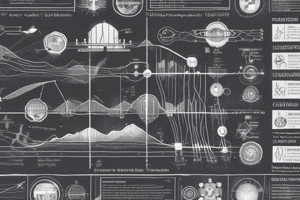Podcast
Questions and Answers
What is the purpose of reading the title and abstract of a scientific article first?
What is the purpose of reading the title and abstract of a scientific article first?
- To interpret the results
- To understand the variables measured
- To outline the research hypothesis
- To skim through the article quickly (correct)
What is typically outlined in the 'Introduction' section of a scientific article?
What is typically outlined in the 'Introduction' section of a scientific article?
- Research hypothesis and background information (correct)
- Data interpretation
- Presentation of results
- Description of study procedures
Which section of a scientific article describes the study's procedures, instruments used, and variables measured?
Which section of a scientific article describes the study's procedures, instruments used, and variables measured?
- References/Bibliography
- Methods (correct)
- Discussion
- Results
What does the 'Results' section of a scientific article typically present?
What does the 'Results' section of a scientific article typically present?
In a scientific article, which section discusses the implications of the study based on the interpreted results?
In a scientific article, which section discusses the implications of the study based on the interpreted results?
Flashcards are hidden until you start studying
Study Notes
Reading is a fundamental skill for accessing information and understanding the world around us. It is a complex process that involves decoding words and understanding their meaning, as well as comprehending the information presented in the text. This article will discuss the importance of reading, the simple view of reading, and how to read scientific literature effectively.
Why Reading is Important
Reading is essential for students interested in research, as it helps them understand what has already been discovered and what questions remain to be answered. It is also crucial for clinicians and researchers to keep abreast of current trends in their fields. With the exponential growth of scientific literature, it is imperative to develop a method for choosing and reading the right articles.
The Simple View of Reading
The Simple View of Reading is a formula that demonstrates the widely accepted view that reading has two basic components: word recognition (decoding) and language comprehension. A student's reading comprehension score can be predicted if their decoding skills and language comprehension abilities are known.
How to Read Scientific Literature Effectively
Reading scientific literature can be intimidating for some, but with a systematic approach, it can be an efficient and rewarding experience. Here is a step-by-step guide:
- Title and Abstract: Start by reading the title and abstract, which provides essential information about the article's topic and the authors' background.
- Introduction: The introduction typically outlines the research hypothesis and background information.
- Methods: This section describes the study's procedures, instruments used, and variables measured.
- Results: The results section presents the data obtained from the study, often accompanied by figures, tables, and/or graphs.
- Discussion: The discussion interprets the results and discusses the implications of the study.
- References/Bibliography: The references list the sources from which the information was obtained.
By following this order, readers can systematically read and comprehend scientific literature. Remember to skim through the article first, focusing on the title, abstract, and conclusions, then read the key elements in detail.
Studying That Suits You
Use AI to generate personalized quizzes and flashcards to suit your learning preferences.




